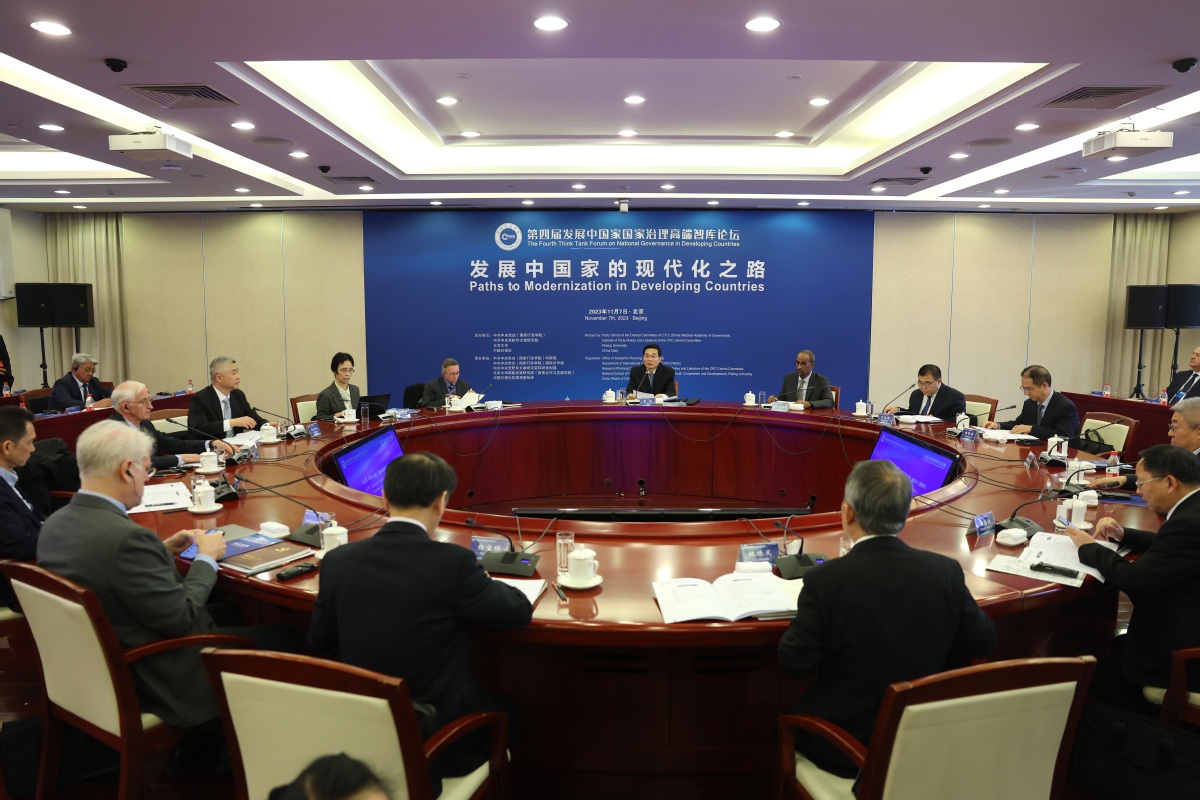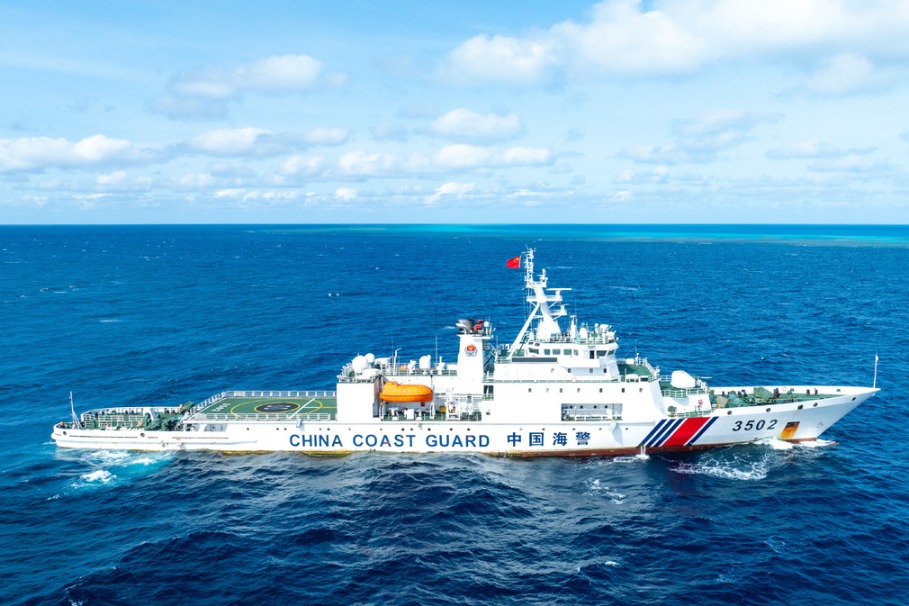Break the myth of Western universalism


The Chinese path to modernization, which is different from that of the West, has set an example for developing countries, according to experts at a forum on Tuesday.
They made the remarks in Beijing at the fourth Think Tank Forum on National Governance in Developing Countries, which was themed "Paths to Modernization in Developing Countries". The event was held by the Party School of the Central Committee of the Communist Party of China (China National Academy of Governance), the Institute of Party History and Literature of the CPC Central Committee, Peking University and China Daily.
Josef Gregory Mahoney, associate editor of the United States-based Journal of Chinese Political Science and professor of Politics and International Relations at East China Normal University, said, "The Western concept of universalism has always been a myth, and it's always been something that was poorly constructed and a historical narrative that the West used to justify a particular period of its history."
After centuries of development, "the West believed that it had reached the endpoint of history that it had discovered, the one true path to development and human progress", he added.
Alessandro Golombiewski Teixeira, former tourism minister of Brazil, said that the central argument of the Western modernization theory is that developing countries need to follow the same path as the West in order to develop, and that "they (developing nations) must adapt to Western cultures and values and industrialize their economies".
Mahoney and Teixeira said that developing countries can look to China, which has found its path, which is different from that of the West.
In opening remarks to the forum, Li Yi, vice-president of the Party School of the Central Committee of the CPC, said, "It was after more than 100 years of effort that China has finally stepped on its own path toward modernization."
Li also referred to the third Belt and Road Forum for International Cooperation, held in Beijing last month, as "an important demonstration of the nation's commitment to joining hands with the whole world on the path toward modernization".
Sun Shangwu, deputy editor-in-chief of China Daily, said that the Chinese path is "a modernization path that the CPC has independently and autonomously explored on Chinese soil".
"The success of the Chinese path to modernization is due to its alignment with China's actual conditions, reflecting the will of the Chinese people, and meeting the requirements of the times," Sun said. "Chinese modernization shares common features with modernization in other countries but also has its unique Chinese characteristics."
Robert Walker, an emeritus fellow at Oxford University's Green Templeton College and a professor at the School of Sociology at Beijing Normal University, highlighted China's success in modernization and the widening gap between developed and developing countries in past decades. He said that world poverty has fallen, but that has predominantly resulted from China's economic success, which has lifted 800 million people out of extreme poverty. However, the global population in extreme poverty has increased by 75 million since 2020, he said.
On a retrospect of China's modern history, Professor Jiang Xiaojuan, who is also the former deputy secretary-general of the State Council, summarized that China raised its requirements of governance in each modernization phase based on its situations and the goals it must achieve, which requires it to constantly raise national governance capabilities to cope with the challenges on its modernization path.
Jeffrey Sachs, a professor at Columbia University's School of Public Affairs, said that China's economic development, especially between 1980 and 2020, offers great lessons to other countries and "can actually serve as a road map for world development in the next 40 years".
With headwinds from US attempts to stop China's rise by imposing trade, as well as financial and technological restrictions, China should diversify its export market, especially through the Belt and Road Initiative, and build strong, long-term links with the rest of the world, especially the promising African region.
Professor Wang Junwei, who is director of the Academic and Editorial Review Committee, the Institute of Party History and Literature of the CPC Central Committee, said in his closing remarks that China's pursuit of modernization is not a modernization of self-preservation, but a modernization that looks forward to working together with other countries, including developing countries, to achieve modernization.
"World modernization should be a modernization of peaceful development, mutual benefit and cooperation, and common prosperity," Wang said.
Younes Abouyoub, chief of governance and state-building at the United Nations Economic and Social Commission for Western Asia, said that while a lack of effective modern governance is a problem facing many developing countries on their modernization path, the question that should be addressed is how to develop strong, capable state institutions that are committed to effective and efficient public service.
Professor Yang Mingwei, who is the director of the Foreign Cooperation and Exchange Bureau, Institute of Party History and Literature of the CPC Central Committee, said that the logic and historical trend of Chinese modernization is irreversible, as the process of the great rejuvenation of the Chinese nation is irreversible.
Teka Entehabu, former Ethiopian minister of trade and industry, said the concept of modernization has many nuanced aspects, but the main focus in Africa will be on fostering ever-important industrial and economic development.
In addition, he said, the BRI has made great contributions to African modernization. "The BRI has provided unprecedented opportunities for the economic growth and modernization of the region by addressing the inadequate state... of infrastructure, trade and technologies."
"The past 40 years have seen rapid global development with China deeply engaging in global governance," said Yao Yang, dean of the National School of Development and executive dean of the Institute of South-South Cooperation and Development, Peking University, "Now the world is marked by a new shift in development, a period of reflection on globalization if not outright de-globalization. The developed countries in turn begin to reflect on their immigration policies, and that is to some extent against the trend of globalization."
"For the developing countries, the challenges lie ahead in readjusting to the global industrial restructuring and transition from externally driven economic growth to one that is driven by internal growth. In this respect, China has a lot of positive experience to offer in its national industrialization, and sets an example of a growth model suited to its development path."
Tang Wenruo, Jin Yiling and Fan Ziqi contributed to this story.
- China successfully debuts safety tech for lithium battery air cargo
- China decries prejudicial nature of some overseas-made games
- Chinese researchers help realize non-invasive insulin delivery through skin
- 159th joint patrol of Mekong River begins
- AI tool can help enhance crop varieties
- Shanghai police expose luxe car insurance scam





































